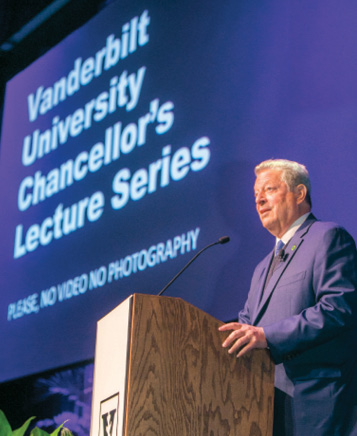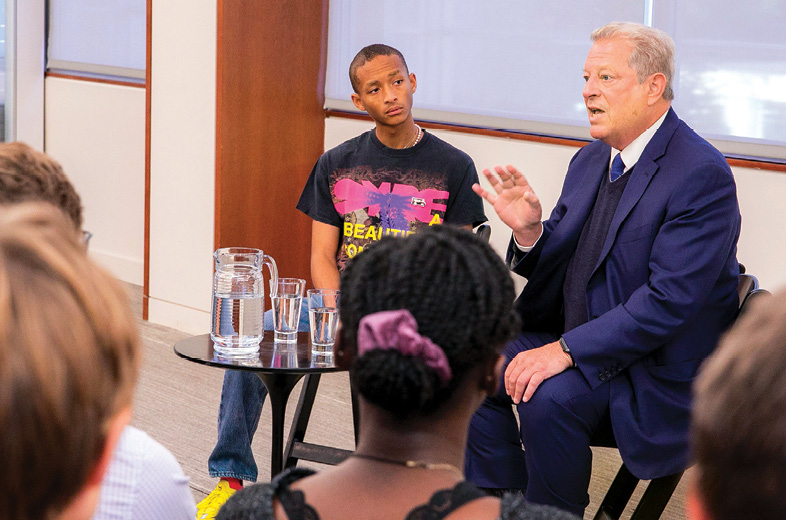
Former Vice President Al Gore hosted a flagship presentation at Vanderbilt University on Nov. 20 as part of a worldwide event called “24 Hours of Reality: Truth in Action.” This global conversation included approximately 1,700 similar events around the world and all 50 U.S. states over a 24-hour period.
The Nobel Peace Prize laureate said he remains optimistic about policy change given the economics of renewable energy and the determination in “the voices, the hearts and the eyes” of today’s youth.
Interim Chancellor and Provost Susan R. Wente introduced Gore to the students, faculty, staff and community members in a packed Langford Auditorium and shared the university’s commitments to environmental stewardship. The event was presented in partnership with the Vanderbilt Chancellor’s Lecture Series.
“As a university, we have committed to becoming carbon neutral and powering our campus entirely through renewable energy by the year 2050,” Wente said. “We are putting our research into action, as our experts in policy, engineering, the environment, infrastructure and other key areas work on solutions to advance sustainability efforts at Vanderbilt and around the world.”
Before beginning his 60-minute slideshow, Gore asked a surprise guest—singer–songwriter and actor Jaden Smith—to come on stage. Gore described Smith as a young-generation leader and activist in the climate movement. Smith said that An Inconvenient Truth, Gore’s 2007 Oscar-winning documentary, transformed his views on the climate crisis.
Gore noted the high chance of 2019 being the second-hottest year on record, a statistic that was, in fact, confirmed by NASA in January. The five hottest years on record have all been in the last five years. He also talked extensively about the impact of the climate on natural disasters that include massive floods and devastating fires around the globe.
Gore presented slides from the 2010 flood in Middle Tennessee, including one that showed a house floating down I-24 from south Nashville to Murfreesboro. “Thousands of my neighbors lost their homes and businesses, and they didn’t have flood insurance because it had never flooded in those areas,” Gore said. “You see events like this happening four times more frequently now than in 1980 all over the world.” One of the negative impacts of increased flooding is the international spread of mosquito-borne diseases, such as dengue fever.

Gore cited several examples of recent fires caused by extremely hot and dry conditions. One such fire resulted in $500,000 in damage to the Reagan Presidential Library in northern California. Gore’s presentation also focused on many solutions to the climate crisis that are being driven by new technology and market trends. He cited a recent announcement that New Jersey will produce 7,500 megawatts of electricity through wind energy by 2035.
Solar technology is another industry growing by leaps and bounds, Gore said. The fastest-growing job in the United States for the last five years has been that of a solar-energy system installer.
In a Q&A with Wente, Gore encouraged the audience to engage with policymakers, emphasizing that the climate crisis is not a partisan issue. He also thanked the Vanderbilt College Republicans for being among those college chapters that have petitioned the National Republican Committee to change its position on climate change.
“Join those who are using their voices and votes to fight the climate crisis,” he said. “For one thing, your world does depend on it. This is the life or death struggle of this generation.”
Earlier in the afternoon, Gore and Smith met with students active in climate advocacy and students who are studying Earth and environmental science.
Gore has longtime connections to Vanderbilt University. His mother, Pauline, graduated from Vanderbilt Law School in 1936, and was among the first women to do so. The former vice president attended Vanderbilt Law School and the Graduate School’s Department of Religious Studies.
—ANN MARIE DEER OWENS